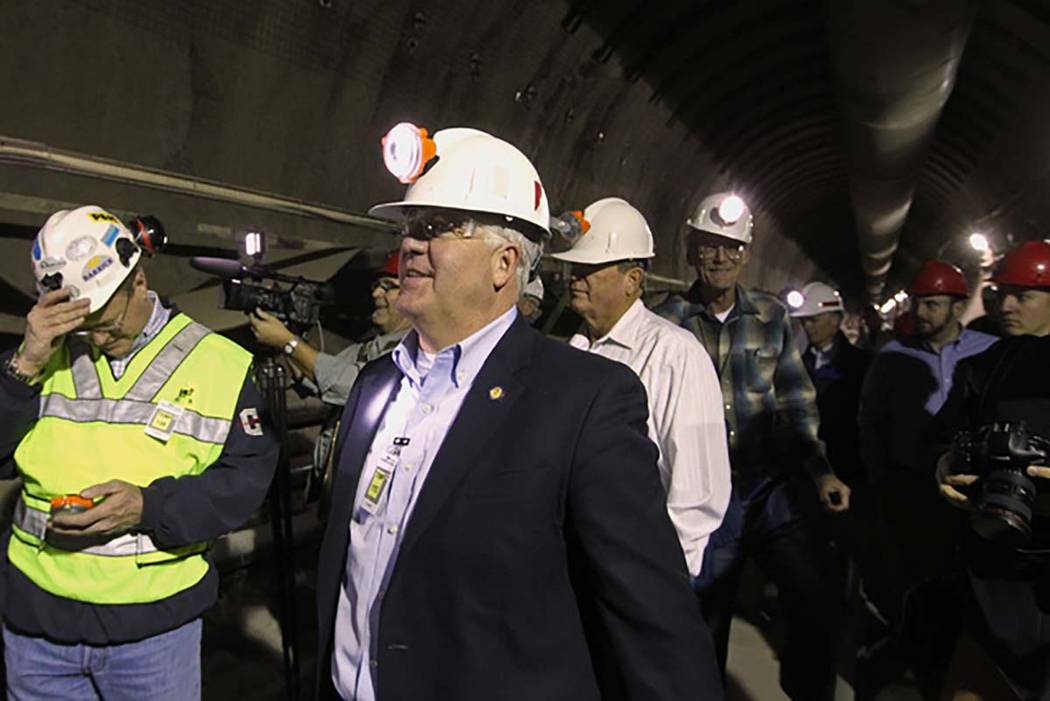
WASHINGTON — U.S. House lawmakers with a vested interest in the permanent storage of nuclear waste in Nevada will make a trek to Yucca Mountain this month to tour the mothballed exploratory tunnel in the geological formation northwest of Las Vegas.
While the Senate remains reluctant to resume the licensing process to open the repository, ongoing efforts by the House give supporters of the project hope the Trump administration can move forward on plans to permanently store the radioactive waste in one of least populous states.
The bipartisan tour, led by U.S. Rep. John Shimkus, R-Illinois., chairman of the House Energy and Environment subcommittee on environment, will take place the weekend of July 14, a committee aide said.
Federal lawmakers last toured the Yucca Mountain site in 2015. Energy Secretary Rick Perry also privately toured the site in 2017.
Nye County’s congressman, U.S. Rep. Ruben Kihuen, D-Nevada, criticized the pending congressional tour.
“Misguided colleagues are again pushing to revive this waste of taxpayer funds,” Kihuen wrote on Twitter July 3. “Transporting nuclear waste through America’s top tourist destination to an active earthquake zone is expensive &dangerous. #NV04 will not become the nation’s nuclear waste dump!” he said in reference to Nevada’s 4th Congressional District that includes Nye County.
U.S. Rep. Dina Titus, D-Nevada, said advocates of the project will be wasting their time and taxpayer dollars by visiting a project she and other Nevada lawmakers have said must never be built.
“Nothing has changed since Chairman Shimkus jetted to Las Vegas in 2015 to take photos in front of a hole in the ground,” she said.
Perry has said there is a “moral obligation” to build Yucca Mountain and uphold federal obligations to safely store nuclear waste.
But federal efforts have met resistance from Gov. Brian Sandoval, a Republican, and the state’s congressional delegation. They oppose storing waste in the repository in rural Nye County and transporting nuclear waste through the state’s cities.
Rural support
Rural Nevada counties generally support the repository and the economic boom they say it would create with high-paying federal jobs and contractors.
Nye County Commissioner Dan Schinhofen, one of the most vocal proponents of Yucca Mountain in Nye County, has said he stands with eight other rural Nevada counties that support vetting the science of Yucca Mountain.
“We just want the law to be followed, and have that body that deals with nuclear issues to hear the science,” Schinhofen said last year.
Licensing procedures for Yucca Mountain were stopped in 2012, when the Obama administration cut funding for the project at the behest of then-U.S. Sen. Harry Reid, D-Nevada.
President Donald Trump has proposed funding to resume the process.
Shimkus wrote legislation that was overwhelmingly passed by the House this year that would streamline the licensing process for the Department of Energy’s application before the Nuclear Regulatory Commission to construct the repository to store waste generated by the nation’s power plants.
Every Nevada member of the House voted against the bill.
The Senate has not approved funding or authorizing legislation to restart the licensing process, although Yucca Mountain was identified by Congress in 1987 as the site for permanent storage of nuclear waste from the reactors for energy generation.
The Senate, most notably Sen. Lamar Alexander, R-Tenn., chairman of the Senate Appropriations subcommittee on energy and water, contends that while Yucca Mountain is an integral part of long-term storage of nuclear waste, interim storage sites must be identified and funded to immediate reduce waste stockpiled at plants nationwide.
U.S. Sens. Dean Heller, R-Nevada, and Catherine Cortez Masto, D-Nevada, both oppose the Yucca Mountain project.
The Pahrump Valley Times contributed to this story.